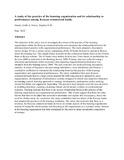| dc.description.abstract | The objective of the study was to investigate the extent of the practice of the learning organization within the Kenyan commercial banks and determine the relationship between the aforementioned practice with organizational performance. The study adopted a descriptive survey design. It was a census survey comprising all the 43 banks licensed to operate in Kenya under the banking Act. The sample frame included all the commercial banks listed in the Central Bank of Kenya website. The 43 banks were further divided into 3 tiers based on profitability for the year 2008 as indicated in the Banking Survey 2009.
Primary data was collected using a structured questionnaire while secondary data regarding organizational performance was obtained from the banking survey 2009. The data collected was analysed using descriptive statistics in terms of frequency and percentage tabulations, cross tabulations and Pearson’s correlation coefficient to determine the relationship between the practice of the learning organization and organizational performance.
The study established that most Kenyan commercial banks had to a large extent adopted the following practices adopted by most organizations: development of information systems designed to inform and empower, formative accounting control, learning approach to strategy development, participative policy making, reward flexibility and supportive leadership. The practices least adopted were the ones involved in enabling structures, creating a learning climate and boundary workers as environmental scanners.
Findings indicate that there is an inverse relationship between the practice of the learning organization and organizational performance. This would suggest that there are other factors that have to be taken into account to determine and explain this discrepancy, hence the need for further study.
In conclusion, the study established that two thirds of the Kenyan banks had adopted the practices of the learning institution. The study also indicates that there is a tendency for Kenyan commercial banks to focus on certain aspects of the learning organization instead of seeing the whole picture and focusing on the organization as a dynamic entity. Interest in the learning organization has been stimulated by the need to attain sustainable competitive advantage. | en |

